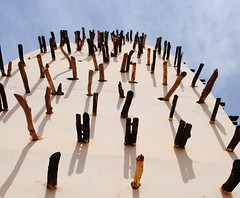So, life in Bamako has been busy and as our time in the city comes to an end the music just gets better. We are on a high. Now it’s the end of another mad day and as our beds call us we feel it’s time for an overdue update, in photo form!
Its April, the weather is hot, sometimes the temperature reaches a scorching 45 degrees. Walking from to the kitchen and back makes you sweat. We both sleep and I begin a folder of photos entitled ‘Mikaela naps through the hot season’…
Our friend Sadio Cissokho arrives from Senegal with his kora to work on the album. Sadio is a creative kora player, arranger and soulful singer. Together with Mikaela’s kamele ngoni teacher, Lassine Kone, we jam with Sadio for the first time since we met him in Casamance. Our musical high begins…

The band meet Sadio and one of our best rehearsals follow. We rehearse at Baini’s house and a crowd gathers. The children dance madly to the music and the sky grows stormy. There’s talk of mango rain.
A mango storm hits the city and as the rehearsal ends the sky is lit up with sheet lightening. We head home on flooded roads as the first rain we have seen in more than 6 months pours onto the dusty streets. We grin and laugh as we paddle through the water back to the house. Beautiful rain, perfect day.






































